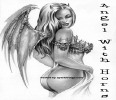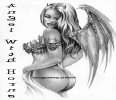is there any other driver thats been involved with so much controvercy since entering F1 like (poor) hamilton ??
A certain Michael Schumacher.
Heres what a quick trawl through the net bags me....
During his long career Schumacher has been involved in several incidents, which have caused considerable controversy. Schumacher has been vilified in the British media for his involvement in title-deciding collisions in 1994 and 1997.[108] German and Italian newspapers widely condemned his actions in 1997.[109] The 1994 incident was viewed by the FIA as a racing incident, and brought no sanction; whereas the 1997 incident saw Schumacher disqualified from the championship standings.
[edit] Championship deciding collisions
Hill (left) and Schumacher (right) crash at the Flinders Street corner during the 1994 Australian Grand Prix
Going into the 1994 Australian Grand Prix, the final race of the 1994 season, Schumacher led Damon Hill by a single point in the Drivers' Championship. Schumacher led the race from the beginning with Hill closely following him. On lap 35, Schumacher went off track, hitting a wall with his right side wheels.[110] It is unknown whether Schumacher's car was damaged, as he returned to the track at reduced speed but still leading the race. At the next corner, when Hill attempted a pass on the inside while Schumacher was turning into the corner, Schumacher and Hill collided. Schumacher's car was tipped up onto two wheels and eliminated on the spot. Hill pitted immediately and retired from the race with irreparable damage. As neither driver scored Schumacher took the title.[111]
Opinion is divided over the incident. British Formula One journalist and author Alan Henry has written that Schumacher was blamed by "many F1 insiders" for the incident,[112] however British Formula One commentator Murray Walker believes it was not a deliberate move.[113] The race stewards judged it a racing accident and took no action against either driver.
Michael Schumacher (red) and Jacques Villeneuve (blue) in the moment of the collision at the Dry Sack corner in the 1997 European Grand Prix at Jerez
At the 1997 European Grand Prix at Jerez, the last race of the season, Schumacher led another driver, this time Williams' Jacques Villeneuve, by one point in the Drivers' Championship. Although Schumacher and Villeneuve had set the same time during qualifying, the Canadian driver started the race in pole position due to his being the first to set the time. By the first corner of the race, Schumacher was ahead of Villeneuve. On lap 48, Villeneuve passed Schumacher at the Dry Sack Corner. As he did so, Schumacher turned into the Williams, the right-front wheel of Schumacher's Ferrari hitting the left side pod of Villeneuve's car. Schumacher retired from the race immediately while Villeneuve was able to finish the race in the third place, taking four points and so becoming the World Champion.[110]
Two weeks after the race, Schumacher was excluded from the results for the season after a FIA disciplinary hearing disqualified him, finding that his "manoeuvre was an instinctive reaction and although deliberate not made with malice or premeditation. It was a serious error."[52] This made him the only driver in the history of the sport, as of 2009[update] to be disqualified from a World Championship.[114] Schumacher accepted the decision[115] and admitted having made a mistake.[109]
[edit] Team Orders
Historically, team orders had always been an accepted part of Formula One. However, during Schumacher's tenure at both Benetton and Ferrari, the team often employed team orders as a matter of routine. Schumacher would generally benefit, with the exception of the final 2 races of 1999, when he supported Eddie Irvine's title bid.[116] This did not attract significant controversy in years where Schumacher was clearly involved in a title battle with drivers from other teams, but his dominant years (2001-2004) saw many accuse him and Ferrari of deploying team orders in a manner that undermined the sport and damaged its credibility.
At the 2002 Austrian Grand Prix, Schumacher's teammate, Rubens Barrichello, took pole and led the race from the start. In the final metres of the race, the Brazilian driver, under orders from Ferrari, slowed his car to make way for Schumacher to pass and win the race.[60] This angered fans who were watching the race and it was claimed that the team's actions showed a lack of sportsmanship and respect to the spectators, with many claiming that Schumacher did not need to be "gifted" wins in only the 6th race of the season, particularly given that he had already won 4 of the previous 5 grands prix, and that Barrichello had dominated the race weekend up to that point. At the podium ceremony, Schumacher pushed Barrichello onto the top step,[60] and for this disturbance, the Ferrari team incurred a US$1 million fine.[117] This was the only penalty incurred, as despite the outcry, the switching of positions did not break any actual sporting or technical regulation. Later in the season at the end of the 2002 United States Grand Prix, Schumacher slowed down within sight of the finishing line, meaning that Barrichello took the win by 0.011 seconds, the 2nd closest margin in F1 history. Nobody, including Barrichello, appeared to know why Schumacher lifted, and Schumacher's own explanation varied between it being him "returning the favour" for Austria (now that Schumacher's title was secure), or trying to engineer a dead-heat (a feat derided as near-impossible in a sport where timings are taken to within a thousandth of a second).[118] The FIA subsequently banned "Team orders which interfere with the race result".[119][120]
[edit] Other incidents
In 1995, Schumacher and Benetton were publicly determined not to incur such controversy, but got off to a bad start when Schumacher and Williams driver David Coulthard were disqualified for fuel irregularities. On appeal, both drivers had their results and points reinstated, but both teams lost the points the results would normally have earned in the constructors championship (for 1995, Benetton switched to Renault engines, also used by Williams. With this switch came a move to using oils from Renault partner, Elf).
The remainder of 1995 went without major controversy, although the title battle with Damon Hill became very intense and acrimonious, particularly after their collisions in the British and Italian Grands Prix, both of which forced the two drivers to retire. Likewise the first two years of his Ferrari career passed with little controversy, until the final race of 1997 (see above).
The 1998 Canadian Grand Prix saw Schumacher accused of dangerous driving when his exit from the pitlane forced Heinz Harald Frentzen off the track and into retirement. Despite receiving a 10 second penalty, Schumacher recovered and won the race. In the press conference, he publicly accused Damon Hill of weaving dangerously as they fought for position, stating "If you want to kill me, find some other way", a statement widely condemned as either hypocritical, or a cynical ploy to divert attention from his actions with Frentzen.[121]
Two laps from the finish of the 1998 British Grand Prix, Michael Schumacher was leading the race when he was issued a stop-and-go penalty for overtaking a lapped car (Alexander Wurz) during the early moments of a Safety Car period. This penalty should have involved going into the pit lane and stopping for 10 seconds. But as the penalty was given with fewer than 12 laps remaining, and since it was issued as a handwritten note, the Ferrari team was confused as to whether the penalty was a stop and go penalty or merely a penalty of 10 seconds to be added to Schumacher's race time. The rules state that a driver must serve his penalty within three laps of the penalty being issued, and on the third lap after receiving the penalty, Schumacher turned into the pit lane to serve his penalty. However, this was the last lap of the race, and as Ferrari's pit box was located after the start/finish line, Schumacher technically finished the race before serving the penalty. The stewards initially resolved that problem by adding 10 seconds to Schumacher's race time, then later rescinded the penalty completely due to the irregularities in how the penalty had been issued.[122]
In the same season, after a race-ending collision whilst trying to lap David Coulthard in heavy spray during the Belgian Grand Prix, Schumacher stormed into the McLaren garage and, as with the incident with Hill in Canada, accused Coulthard of trying to kill him. Television viewers saw an obviously-furious Schumacher shouting at Coulthard, while both McLaren and Ferrari team members attempted to restrain him and move him away from the McLaren garage. Coulthard recanted some 5 years later after an incident caused him to suffer a similar accident[53]
Rubens Barrichello makes way for Schumacher at the end of the 2002 Austrian Grand Prix
Minor controversy came at the 2000 Austrian Grand Prix where, after being hit at the first corner, Schumacher slowly moved his stricken car out of the gravel, and abandoned it on the racing line. Critics saw this as an (unsuccessful) attempt to force the race director to restart the race (2000 rules would have allowed him to take the restart in the spare car).
Although Schumacher took the pole position during the qualifying for the 2006 Monaco Grand Prix, there was controversy near the end of the session. Schumacher stopped his car in the Rascasse corner, partially blocking the circuit, while his main contender for the season title, Fernando Alonso, was on his qualifying lap. Schumacher stated that he simply locked up the wheels going into the corner and that the car then stalled while he attempted to reverse out.[123] Alonso believed he would have been on pole if the incident had not happened.[124] Schumacher was later stripped of pole position by the race stewards and started the race at the back of the grid.[123]
,
 Le coeur a ses raisons que la raison ne connaît point.
Le coeur a ses raisons que la raison ne connaît point. 